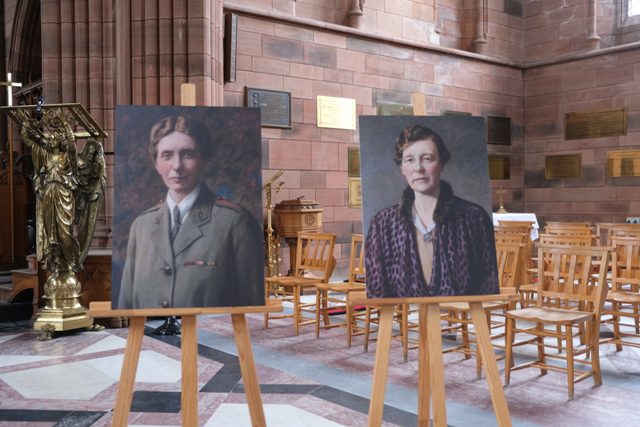A CEREMONY in the Crichton Memorial Church on Friday 28th July 2023 marked the hundredth anniversary of the death of pioneering doctor and suffragette Flora Murray.
Dr Heather Currie MBE, a locum consultant gynaecologist at Dumfries and Galloway Royal Infirmary, spoke at the commemoration, recognising Dr Murray’s medical achievements.
Dr Currie said: “I feel ashamed that I was not aware of this amazing lady and her connection to this area, despite living and working in Dumfries and Galloway for 40 years. I am very thankful to the team for bringing her life to our attention and arranging this event to finally give her the local recognition which is so much deserved and long overdue.
“I am humbled to be asked to speak to represent NHS and women in medicine in particular. I am eternally grateful to Flora for all that she did – not only to change women’s role in medicine, but also their role in society – and for all her dedication, hard work, commitment, as she faced huge obstacles and challenges.
“Her work, and that of others paved the way to make it eventually easier for women to contribute equally, without prejudice or discrimination. More than 60% of medical students in UK are now women and I can say personally that since becoming a doctor I have never felt at a disadvantage from being a woman.
“We still need people like Flora who can identify injustice, face obstacles without giving up, and follow their gut instincts and heart when something is wrong, not just accept that something has always having been done that way. She embodied the suffragette motto of ‘Deeds not words’.”
The Lord Lieutenant of Dumfries, Fiona Armstrong, said: “This is a hugely moving service – I have been sitting here with a lump in my throat. This is a story that needs to be more widely told. Between them these extraordinary women performed seven thousand operations – I wonder how many lives they saved?”
The ceremony also included addresses by humanist celebrant Lindsey Mason Ross and Andrew Morton, a reader at Dr Murray’s family church, Dalton Parish Church. The Cairn Chorus Choir performed along with piper Lani O’Neill.
Dr Murray was born in Murraythwaite House near Dalton, east of Dumfries, in 1869. After studying medicine at the London School of Medicine for Women she returned to Dumfries in 1903 to work as a medical assistant at the Crichton Royal Institution, which was then a hospital for people with mental illness.
With her partner, Dr Louisa Garrett Anderson, she joined the women’s suffrage movement, founded the Women’s Hospital for Children in London in 1912, and provided medical support to the suffrage movement, testifying to Parliament on the effects of force-feeding in prison and caring for campaigners injured during protests.
On the outbreak of war in 1914, Drs Murray and Anderson founded the Women’s Hospital Corps, and within six weeks of their arrival in Paris they opened the doors of a new hospital, operating out of a hotel building. Dr Murray was the chief physician and Dr Anderson the chief surgeon.
Event organiser DJ McDowall commented: “When the first patients arrived in this hospital, they were very alarmed to see that it was mostly staffed by women, and they thought it meant they had given up on them. But very soon they had developed a huge amount of respect for the staff at the hospital – they were even joining in singing suffragette songs!”
In 1915 Dr Murray, Dr Anderson and the rest of their staff moved to London to run the Endell Street Military Hospital.
Over the course of the war 50,000 seriously wounded British, Commonwealth and Imperial soldiers were treated at Endell Street and at the Corps hospitals in Paris and Wimereux. Dr Murray used what she had learned at the Crichton, where groundbreaking approaches to the treatment of mental illness were being tested. Endell Street included a library for its patients, and used arts and crafts to help their psychological as well as physical recovery.
Both women were awarded the rank of Commander of the Order of the British Empire (CBE) in 1917 for their work with the Women’s Hospital Corps. Dr Murray was by this time a lieutenant-colonel in the Royal Army Medical Corps, the highest-ranked woman in the British armed forces.
Dr Murray died aged 54 in 1923 and is buried near her home in Buckinghamshire. She shares her gravestone with Dr Anderson, who died in 1943. The inscription on the gravestone reads: ‘WE HAVE BEEN GLORIOUSLY HAPPY’.






